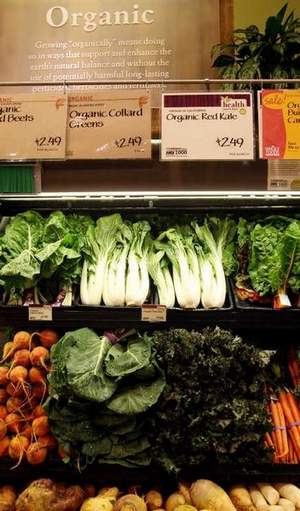Help grow Detroit’s food market choices
May 29, 2012
Source: Detroit Free Press
Author: Heaster Wheeler
The recent announcement of the groundbreaking for two new supermarket chain grocery stores in Detroit is certainly welcome news for the city, but it is only a part of the march toward addressing the area’s needs for retail food options.

Organic vegetables available at the Ann Arbor Whole Foods store. The company announced plans to open a new store in Detroit’s Midtown area. / FILE PHOTO BY REGINA H. BOONE/DETROIT FREE PRESS
The commitments to build in the city by the upscale natural and organic foods grocery store chain Whole Foods and Michigan-based Meijer will fill a critical void in providing a wide variety of fresh, reasonably priced and well-stocked food items for Detroit residents.
Most residents have had to rely on mostly independent, small markets or convenient stores for their weekly supplies that were limited in their variety of food choices. Or they had to travel outside the city to the suburbs for basic, reasonably priced food staples.
For the elderly and poor without reliable transportation, it was a challenge just getting to such enterprises, and when they did, it could be a humiliating ordeal. Often, they were left with products that were overpriced, fatty, sugary with large amounts of carbohydrates and artificial additives that were just plain unhealthy.
In an urban agriculture policy paper for the City of Detroit, Professor John Mogk of Wayne State University Law School, a specialist on urban development, pointed out that while most Detroit streets are dotted with convenience and liquor stores, the city has few major food chains.
"A study of all food stores in three low-income postal codes in Detroit found that only 19%, or fewer than one in five stores, carried a minimal ‘healthy food basket’ (products based on the food pyramid). As a result, city residents have limited access to food other than fast foods and poor-quality, highly processed and highly caloric foods. Detroit ranks fifth in the United States for its obesity rates. The lack of access to healthy foods is one of the leading causes of obesity in Detroit," he wrote in the report.
So the groundbreaking for the Whole Foods in Midtown and the new Meijer as part of the new 350,000-square-foot shopping center on 8 Mile Road become are critical events.
To build on that momentum, and to usher in more Detroit-owned-and-operated independent grocery stores, the Fair Food Network and TechTown are launching the Detroit Grocery Incubator Fellowship. This four-month program will train Detroiters to become entrepreneurs by immersing them in how to run a business, and by having participants spend 13 days training at a Philadelphia-based ShopRite.
The program’s key facilitators are Jeff Brown of ShopRite and Mike Basher with ShopRite and UpLift Solutions. Brown created a model for operating profitable supermarkets in low-income communities, while UpLift provides technical assistance to grocers and communities to improve grocery options across the U.S.
Detroit residents spend close to $200 million outside of their neighborhoods, and there are about 10 grocery stores for every 100,000 people. The hope is that the next big investment news is about Detroiters having the opportunity purchase healthy foods closer to home in stores that are owned locally.

Heaster Wheeler
Detroit Free Press guest writer Heaster Wheeler is cochair of Detroit Works. Originally published at Freep.com on May 24, 2012.







